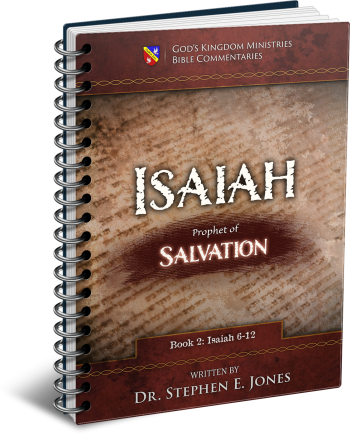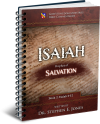Latest Posts
View the latest posts in an easy-to-read list format, with filtering options.

Isaiah is the prophet of Salvation. He is also known as the truly "Universalist" prophet, by which is meant that He makes it clear that salvation is extended equally to all nations and not just to Israel. He lived to see the fall of Israel and the deportation of the Israelites to Assyria, and he prophesied of their "return" to God (through repentance). He is truly a "major prophet" whose prophecies greatly influenced the Apostle Paul in the New Testament.
Category - Bible Commentaries

God uses idolatrous nations as vessels of dishonor to bring judgment upon His people for their refusal to recognize God’s right to rule. Then God judges that same nation that He used for His purpose, not for bringing judgment upon His people but for their arrogance in taking credit for it themselves. Assyria’s boast of self-generated power was thus condemned in Isaiah 10:15,
15 Is the axe to boast itself over the one who chops with it? Is the saw to exalt itself over the one who wields it? That would be like a club wielding those who lift it, or like a rod lifting him who is not wood.
God made it very clear that He alone is directing the affairs of human history in a complex array of judgments for sin, beginning with the sin of Adam. Generally speaking, all of the destruction, death, and misery on earth has been the result of sin and therefore also the judgment for sin. To give credit to men and earthly nations is an affront to God Himself. An axe does not have any power of its own to chop down a tree. A club has no power of its own, nor does a wooden rod have power over the one who wields it.
The prophet revisits this topic later in Isaiah 29:16,
16 … Shall the potter be considered as equal with the clay? That what is made would say to its maker, “He did not make me”; or what is formed say to him who formed it, “He has no understanding”?
Again, he tells us in Isaiah 45:9, 10,
9 Woe to the one who quarrels with his Maker—an earthenware vessel among the vessels of the earth! Will the clay say to the potter, “What are you doing?” Or the thing you are making say, “He has no hands?” 10 Woe to him who says to a father, “What are you begetting?” Or to a woman, “To what are you giving birth?”
To such people—mere clay vessels in God’s hands—God answers in Isaiah 45:11, 12,
11 Thus says the Lord, the Holy One of Israel, “Ask Me [i.e., Do you question Me] about the things to come concerning My sons, and you shall [i.e., do you] commit to Me the work of My hands? 12 It is I who made the earth and created man upon it. I stretched out the heavens with My hands, and I ordained all their host.
Verse 11 above should be read as questions, rather than statements of fact. The Hebrew language had no question marks to tell us whether or not the statements were questions. Yet the context shows that God was indignant that men would be so arrogant as to think that they had the right to question what God was doing in the earth. “It is I,” God says, “who made the earth and created man upon it.” Again, God says, “I am the one who created the heavens and the stars—not you.”
By the law of Creator’s rights, God is the One who owns and directs the affairs of His creation. Man’s authority is limited by God’s sovereignty, and even if men do not understand the ways of God, they have no right to question Him. The Apostle Paul affirms this in Rom. 9:20, 21,
20 On the contrary, who are you, O man, who answers back to God? The thing molded will not say to the molder, “Why did you make me like this?” will it? 21 Or does not the potter have a right over the clay, to make from the same lump one vessel for honorable use and another for common use?
Hence, the Assyrian boast about its power and sovereignty was an affront to God, and for this reason judgment was pronounced upon Assyria, even though God took full credit for using Assyria to bring judgment upon Israel. If Assyria had given God the credit, they might have avoided divine judgment a century later.
Isaiah 10:16 says,
16 Therefore the Lord, the God of hosts, will send a wasting disease among his stout warriors; and under his glory a fire will be kindled like a burning flame.
Even the strongest warriors become weak and are helpless when stricken with “a wasting disease.” This disease undoubtedly is just a metaphor, but it shows how easy it was for God to weaken the nation and its army and make it vulnerable to outside invaders. Assyria’s “glory” in this case was its arrogant boast of power and sovereignty. God vowed to kindle a fire under Assyria’s glory in order to show its emptiness and foolishness.
Isaiah 10:17 continues,
17 And the Light of Israel will become a fire and his Holy One a flame. And it will burn and devour his thorns and his briars in a single day.
The “Light of Israel” was not Israel itself but Christ Himself, who was to come to Galilee with the light of truth, as the prophet foretold in Isaiah 9:1 and 2. Truth is a light that dispels the darkness of lies. Truth is also a fire and a flame that burns chaff and all fleshly opinions. Fire devours the thorns and briars of idolatry and wickedness, which were the result of God’s curse upon the ground in Gen. 3:17, 18.
Isaiah 10:18, 19 concludes,
18 And He will destroy the glory of his forest and of his fruitful garden, both soul and body, and it will be as when a sick man wastes away. 19 And the rest of the trees of his forest will be small in number that a child could write them down.
Again, the prophet uses metaphoric language for “soul and body,” speaking of it in terms of a forest and a fruitful garden. The Hebrew word for “forest” is ya’har, “thicket; honeycomb.” It pictures a thick forest or the wax cells of a honeycomb that are packed tightly together. In either case, the word pictures vibrant life and is Isaiah’s metaphor for the soul.
The “fruitful garden” is from the Hebrew word karmel. Mount Carmel was named because of its fruitful vineyards and orchards. Isaiah uses the word as a metaphor for the “body,” insofar as its ability to “be fruitful and multiply” (Gen. 1:28).
Yet both body and soul, the prophet says, will waste away like a sick man, Both body and soul are mortal and will ultimately waste away, because they were begotten by mortal seed, as we read in 1 Peter 1:23-25. Isaiah then compares the Assyrians to “trees of his forest” that would be burned down by the fire of God and thereby be reduced to a few. Perhaps Isaiah had seen the aftermath of a forest fire.
With the death of Ashurbanipal in 627 B.C., the empire began to fall apart as various outlying provinces began to break away. Assyria’s capital, Nineveh, fell in 612 B.C. to a coalition of forces that included Babylonians, Medes, Persians, and Scythians.
The Scythians were Skuths (pronounced “Scots”) and were the progenitors of the modern Scots of Scotland. In other languages they were known as Sakka (Susian), Saka (Old Persian), Sacae (Greek), and Saxons (Latin). On the Behistun Inscription on the Tomb of Darius, the Babylonian equivalent of Sakka and Saka was Gimira, who were the Israelites who had been exiled to the land of Gamir.
The Assyrians then moved their capital to Harran, which too fell about 609-607 B.C. This effectively ended the Assyrian era and prepared the way for the Babylonian empire. Oddly enough, Nabonidus, the last king of Babylon (with his son and co-regent, Belshazzar) was an Assyrian from Harran.
So we see how Isaiah’s prophecy of the forest fire destroying Assyria came to pass a century later on account of the arrogance of the Assyrian kings. The same principles of divine judgment have applied to all four of the next dominant empires, beginning with Babylon. Daniel prophesied of four empires in succession, along with some “horns” (extensions), all of which were destroyed by God for their arrogance or for overstepping their bounds. The same sickness that came upon Assyria has now come upon Mystery Babylon.
Throughout the Israelite’s long-term exile, the remnant of grace have continued to maintain the hope and the continuance of the promises of God. Although the vast majority of the people were under divine judgment, the remnant people were those chosen by the sovereign grace of God to carry the light of truth in the midst of the darkness. The eyes of the remnant remained open to the light of truth, while “the rest were blinded” (Rom. 11:7, KJV).
And so, in the rest of the chapter (Isaiah 10:20-34) the prophet turns his attention to the remnant that was to carry the hope of Israel within their hearts until the time of judgment and exile had run its course. We are now living at the time of the end when the remnant is to emerge from obscurity at the end of the long tribulation.